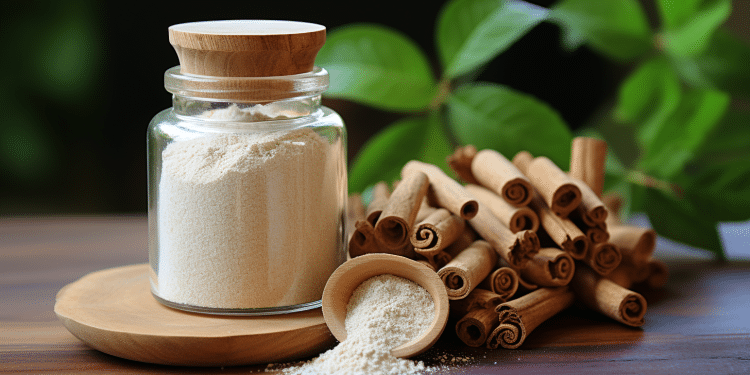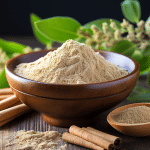If you find yourself locked in a pre-dawn staring contest with the clock on your bedside table more nights than you would like to admit, you are not alone. Somewhere between 50 million and 70 million people do not get the ideal amount of sleep they need in the United States, and 11% of those people report that they are sleeping too little in general. Fortunately, there are supplements to help you get the sleep that you need, and this is key because getting better sleep is essential for your overall health.
Two sleep supplements people often take for better rest are Ashwagandha and Melatonin. Let us discuss each individually, how they work together, and more ways to get better sleep, starting today! Ashwagandha, also known as withania somnifera, is an ancient herb traditionally used in Ayurvedic practices, growing all over Asia, especially in India and Sri Lanka, as well as in Africa. It is classified by many health practitioners as an adaptogen. This means that it is a substance that helps your body adjust to physical and mental stress.
It has a long history of usage, having been used to help with both physical and mental energy, and for mental health. Sure enough, studies suggest that Ashwagandha may support the way that your body reacts to stress. And if you are struggling with sleep because worries are keeping you awake at night, another study found this ancient herb may help you eventually settle down your mind and fall asleep. As an added benefit, taking Ashwagandha supplements can offer several other benefits, including supporting already-healthy cholesterol levels, healthy inflammatory responses, healthy nerve system and hormone functioning, as well as weight control and body composition. Ashwagandha also supports memory and attention, which is critical for anyone feeling foggy from an uneventful night of tossed-off thoughts.
What is Melatonin?
Melatonin is a hormone mainly produced by the pineal gland in your brain. Its job is to tell your body it is time to sleep. Because of that, your body produces more Melatonin at night, then levels decrease in the morning, telling your body that it is time to wake up and go to work. This cycle of sleep is what we refer to as your circadian rhythm.
Supplementing with Melatonin helps those struggling with sleep to eventually get a shutdown, get a little bit of sleep. Similar to Ashwagandha, Melatonin may also help support your already healthy cortisol levels. Cortisol is the stress hormone, so it may support your mood and ability to handle stress.
Can You Take Ashwagandha and Melatonin Together?
Yes, you can take Ashwagandha and Melatonin together as there have been no reported side effects from doing so, and both supplements are very safe on their own. If you find that sometimes sleep is not coming for you as you are keeping so many things on your mind, then taking Ashwagandha and Melatonin together is a great idea. Ashwagandha supports a more tranquil state of mind, so that your final thoughts that day are not going to revolve around if you forgot about your sisters-in-laws birthday, or what your colleague actually meant by that comment. Then melatonin kicks in to do its job supporting healthy nighttime sleep.
The key, however, is making sure that you are getting the proper amounts of each of these nutrients, you do not want to get too high. Your best option is to find a supplement that has them all together in one formulation. Many supplement companies offer 120mg of proprietary Ashwagandha extract and 1.5mg Melatonin, offering the best balance of both ingredients. The specific type of Ashwagandha used was found to be helpful in improving sleep quality after six weeks of use.
Ashwagandha vs Melatonin
Both Ashwagandha and melatonin can potentially make you sleepy and improve your ability to relax. While it is possible to produce melatonin in your body naturally, levels may decrease over time; Melatonin supplements are a good option if you are experiencing decreases in the natural levels of this hormone, which happens frequently with aging. Ashwagandha is a plant that has a long history of being used to promote feelings of relaxation.
It is important to note that taking melatonin past the time of sleep can potentially disrupt the natural cycle of your sleep-wake cycles. You can, however, take Ashwagandha supplements anytime throughout the day. It can help you feel more peaceful, but unlike Melatonin, it does not promote sleep directly. Rather, it helps you get back into a calm state. So, you can take it during the day, as well as at night.
Does taking them together actually work?
Some supplements offer the best of both worlds, including Ashwagandha, accompanied by some Melatonin. With these two together, you are positioning yourself for increased sleep and higher quality sleep, which are both essential to recharge the body.
When is the best time to take melatonin with ashwagandha?
Because this supplement is designed to help you sleep better, you should take it between 30 and 60 minutes before going to bed, unless you are advised by a health care provider to do otherwise. This will vary depending on the particular supplement that you are taking.
Melatonin products range, but the typical dosage is between 1 and 10 mg. Consult with your healthcare provider first, or for extra safety, always start at the lower end. Ashwagandha supplements are typically about 120-125 mg.
Are there any side effects?
Both Melatonin and Ashwagandha are safe for use. The key is following the instructions and dosing instructions on the bottles. You should not drink alcohol, drive, or operate heavy machinery after taking melatonin. Generally speaking, Ashwagandha is safe for use, and has a centuries-long track record. That is, if you experience any negative effects, discontinue using any supplements immediately.















